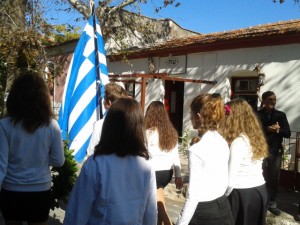Επέτειος του Όχι
(Epétios tou Ochi – Anniversary of “No”) is celebrated annually throughout Greece and commemorates the rejection of the ultimatum given to Greece by Mussolini on October 28, 1940 before the start of the Greco-Italian War. The Greek dictator Ioannis Metaxas allegedly refused to accept it with only the one word “οchi” (όχι – no). It is the second most important national holiday after March 25, which commemorates the liberation of Greece from Ottoman rule. Military parades and school and student parades are usually organized, and all public buildings are decorated with Greek flags.
On April 7, 1939, Albania was occupied by the Italians. This was a forewarning towards Greece. The ultimatum was delivered to Metaxas at his home shortly after three in the morning. It included demands that Greece allow the Axis powers to enter Greek territory and occupy unspecified “strategically important points”, a rejection of this demand would be met with war. According to legend, Metaxas answered this ultimatum with a simple “no” (όχι, ochi). In response to Metaxas’ rejection, Italian troops marched into northern Greece from Albania – an Italian “protectorate” at the time – as early as 5:30 a.m. Greece thus entered the Second World War as a belligerent party.
On the morning of October 28th, large parts of the Greek population, regardless of their own political orientation, took to the streets to express their protest against the Italian invasion with shouts of “Ochi, ochi”. The small Greek army repulsed the numerically superior but poorly organized and unmotivated enemy in the Pindos Mountains and marched to northern Epirus (southern Albania). Hitler then had to come to the aid of his ignominiously defeated ally Mussolini in order to get the situation in the Balkans under control for the benefit of the Axis powers. The occupation of Greece by the German army began in April 1941 in the north of the country as a Balkan campaign and ended in May 1941 with the conquest of Crete. Source: Wikipedia
Even in Raches, a few days before the holiday, everything points to the coming celebrations. You can hear whistles blowing in the schoolyards, where sports teachers are practicing marching steps for the student parade with their classes. History is explained and songs and poems are practiced. On the last day of school before the holiday, the classes hold small celebrations in their schools. On October 28th there will be a parade of all school children from kindergarten to senior year, all dressed in the national colors of blue and white, across the entire village to the memorial to the fallen, where speeches will be given and wreaths will be left. Only the best in class are allowed to carry the flag and are applauded by the spectators throughout the procession. A walk into the village church, the priest’s blessing and finally traditional Greek dances are performed by students in traditional costumes on the village square to great applause from the audience. Finally, you take the opportunity and spread out into the kafenions around the village square
gemütlichen Beisammensein. Das Dorf füllt sich für einen Tag lang mit Erwachsenen und Kindern! Gegen Sonnenuntergang beginnen dann hier und dort eine Live-Band den Tanzabend einzustimmen.

